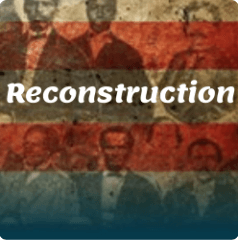
Re-Test: Unit 6 / Reconstruction
Quiz by Scott Philipp
Feel free to use or edit a copy
includes Teacher and Student dashboards
Measure skillsfrom any curriculum
Tag the questions with any skills you have. Your dashboard will track each student's mastery of each skill.
- edit the questions
- save a copy for later
- start a class game
- automatically assign follow-up activities based on students’ scores
- assign as homework
- share a link with colleagues
- print as a bubble sheet
- Q1
This was a farming system in which landowners provided the land and materials, while a tenant provided the skilled labor, giving two-thirds of the harvest back to the landowner.
indentured servitude
sharecropping
team farming
300s - Q2
In response to the 13th Amendment, these regulations were passed by southern states to keep freed people in a slave-like condition after the Civil War.
Amnesty
Poll Taxes
Black Codes
300s - Q3
This amendment to the Constitution guaranteed all male citizens of the United States the right to vote.
13th
14th
15th
300s - Q4
This Supreme Court Justice believed that all citizens were equal before the law regardless of race and therefore dissented from the decision of “separate, but equal”.
Thurgood Marshall
Booker T. Washington
John Marshall Harlan
300s - Q5
This amendment to the Constitution officially banned slavery in the United States.
13th
15th
14th
300s - Q6
This individual encouraged African Americans to make themselves necessary to the South’s economy by getting an education and being trained in a skill.
Booker T. Washington
John Marshall Harlan
Thurgood Marshall
300s - Q7
He was the trial attorney who served on the case that would overturn the results of Plessy v. Ferguson.
John Marshall Harlan
Thurgood Marshall
Booker T. Washington
300s - Q8
These were opportunists who traveled from the North into the South during Reconstruction, looking for opportunities to make money or “get rich off the misfortunes of the South”.
Scalawags
Carpetbaggers
Copperheads
300s - Q9
This Reconstruction Plan provided amnesty to all southerners who took an oath of loyalty to the North, which included requiring Southern States to abolish slavery, but permitted the denial of voting rights to African Americans.
Presidential Plan
10% Plan
Congressional Plan
300s - Q10
This compromise ended the military occupation of the South in return for the southern Democrats' agreement to accept Rutherford B. Hayes as President of the United States.
Compromise of 1877
Missouri Compromise
Compromise of Atlanta
300s - Q11
The legal decision reached in this court case made it easier to promote the unfortunate practice of segregation.
Brown v. Board of Education
Roe v. Wade
Plessy v. Ferguson
300s - Q12
The conspiracy to attack Vice President Andrew Johnson on the same night that Lincoln was shot at Ford’s Theater included an attack against the Secretary of State, ____________.
Thomas Sewart
Ulysses S. Grant
William Seward
300s - Q13
Which was not a privilege that freed people experienced during Reconstruction?
Pursuit of education
Participation in the election process
Ability to freely move throughout the south
300s - Q14
Which best expresses the relationship between the legal cases of Brown v. Board of Education and Plessy v. Ferguson?
The Brown case reaffirmed the Plessy legal decision.
The Brown case overturned the Plessy legal decision.
The Plessy case overturned the Brown legal decision.
300s - Q15
After Reconstruction ended, what did many southern states do to enforce segregation?
Created grandfather clauses
Created slave codes
Created Jim Crow laws
300s